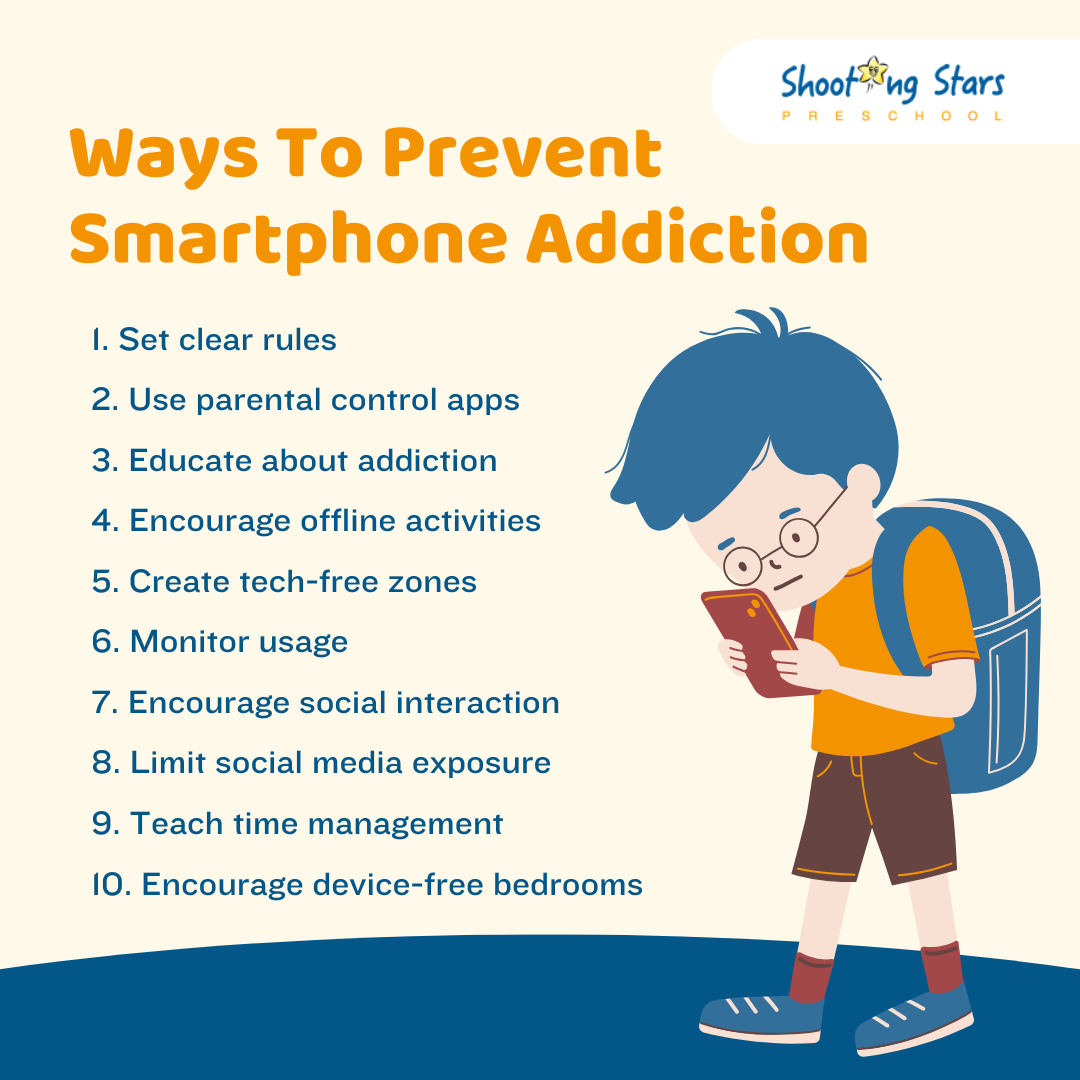|
Smartphone addiction in kids, often referred to as problematic or excessive smartphone use, is a behavioral disorder characterized by the compulsive and excessive use of smartphones, which interferes with a child's daily life, activities, and well-being. It can lead to various negative consequences and can affect the child from a very early stage-as early as the kindergarten stage.
Though smartphones are useful for kids in terms of learning and communication, parents need to set limits, monitor usage, and ensure age-appropriate content to balance their screen time and protect their well-being from a very early stage.
Factors Contributing To Smartphone Addiction In Children1. Easy accessibility
The widespread availability of smartphones makes them easily accessible to children, increasing the likelihood of excessive use.
2. Peer pressure
Children often want to fit in with their peers, and if their friends are using smartphones extensively, they may feel pressured to do the same.
3. Entertainment and social media
Smartphones offer a wide range of entertainment and social media platforms that can be highly engaging for children, encouraging prolonged use.
4. Parental role modeling
If parents themselves are constantly on their smartphones, children may mimic this behavior, considering it normal.
5. Instant gratification
Smartphone apps and games often provide instant rewards and feedback, which can be addictive for children seeking immediate satisfaction.
6. Escapism
Some children may use smartphones as a way to escape from real-life problems or stressors.
7. Fear of missing out (FOMO)
Social media can instill a fear of missing out on what peers are doing, leading children to check their phones frequently.
8. Lack of alternative activities
If children don't have access to or are not encouraged to participate in other offline activities, they may switch to smartphones for entertainment.
9. Boredom
Smartphones can be a quick solution to boredom, and if children are not engaged in other meaningful activities, they may rely on their devices for constant stimulation.
10. Educational use
While smartphones can be beneficial for education, excessive educational app usage can also contribute to smartphone addiction.
11. Parental permissiveness
If parents do not set limits on screen time or are permissive about smartphone use, children may not learn to moderate their usage.
Parents and caregivers need to be aware of these factors and take proactive steps to mitigate the risks of smartphone addiction, such as setting limits, promoting alternative activities, and fostering responsible digital behavior.
Shooting Star Preschool in Dublin provides an activity schedule and encourages children to engage in all activities.
Signs Of Smartphone Addiction1. Excessive screen time
Spending an excessive amount of time on their smartphone, often to the detriment of other activities.
2. Neglecting responsibilities
Failing to complete schoolwork, chores, or other responsibilities due to smartphone use.
3. Withdrawal symptoms
Becoming irritable, anxious, or agitated when not allowed to use their smartphone.
4. Preoccupation
Constantly thinking about or wanting to use the smartphone, even in inappropriate situations.
5. Loss of interest
A decrease in interest in other hobbies or activities they previously enjoyed.
6. Hiding usage
Being secretive about smartphone use, such as hiding or lying about screen time.
7. Social isolation
Withdrawing from in-person social interactions to spend more time on the phone.
8. Sleep problems
Experiencing sleep disturbances due to late-night smartphone use.
9. Declining academic performance
A noticeable drop in school grades and performance.
10. Physical health issues
Suffering from physical health problems like eye strain, headaches, or posture-related issues.
11. Mood changes
Displaying mood swings, increased irritability, or signs of depression or anxiety related to smartphone use.
12. Neglecting basic needs
Skipping meals or neglecting personal hygiene due to excessive smartphone use.
If you observe multiple of these indicators in a child, it could suggest they have developed smartphone addiction, and it's crucial to tackle the problem by engaging in open dialogue, establishing boundaries, and, if necessary, seeking professional assistance.
It is also necessary for parents to actively manage and monitor their child's smartphone use to mitigate these disadvantages and provide guidance on responsible and balanced screen time.
Preventing Smartphone Addiction In Kids
Preventing smartphones in children requires proactive steps and guidance.
1. Set clear rules and boundaries
Establish specific guidelines for smartphone use, including time limits, places where they can use the device, and which apps or content are appropriate.
2. Use parental control apps
Consider using parental control apps to monitor and restrict screen time, block inappropriate content, and track app usage.
3. Educate about addiction
Teach your child about the dangers of smartphone addiction and how it can affect their physical and mental health.
4. Model healthy behavior
Parents can set a responsible example for their children by demonstrating appropriate smartphone usage.
5. Encourage offline activities
Promote offline activities like sports, hobbies, reading, and creative play to reduce the time spent on smartphones.
6. Create tech-free zones
Designate certain areas or times in your home as smartphone-free, such as during family meals or before bedtime.
7. Reward responsible use
Offer positive reinforcement, like additional privileges or rewards for responsible smartphone use and adhering to screen time limits.
8. Open communication
Maintain open and non-judgmental communication with your child. Please encourage them to talk about their experiences and challenges with smartphone use.
9. Monitor usage
Regularly check your child's smartphone usage and ensure they're not using it excessively or engaging in inappropriate activities.
10. Teach time management
Please help your child learn time management skills so they can balance their responsibilities and leisure activities effectively.
11. Encourage social interaction
Encourage in-person social interactions with friends and family. Plan activities that involve face-to-face communication.
12. Limit exposure to social media
Delay the introduction of social media accounts until your child is mature enough to handle them responsibly.
13. Promote self-awareness
Teach your child to be mindful of their screen time and recognize when they're spending too much time on their device.
14. Provide alternatives
Offer alternative entertainment and learning options that don't involve smartphones.
15. Support offline learning
Encourage learning experiences without screens, such as reading books, visiting museums, or engaging in hands-on educational activities.
16. Device-free bedrooms
Research suggests that smartphones can have harmful effects on sleep.
Having your phone close to you in bed may lead to the temptation of checking it before going to sleep or right after waking up. Furthermore, its presence in the bedroom can also cause sleep disturbances due to notifications and the blue light that the device emits. Maintaining a phone-free bedroom can help alleviate phone addiction and promote better sleep hygiene.
Conclusion
Preventing smartphone addiction is an ongoing process that involves guidance, monitoring, and fostering a healthy balance between technology and other aspects of life. Tailor your approach to your child's age, maturity, and individual needs. Remember that it's required to strike a balance, as smartphones are increasingly integrated into daily life. The goal is not to keep kids away from smartphones entirely but to ensure they use them in a healthy and controlled manner.
Comments are closed.
|



